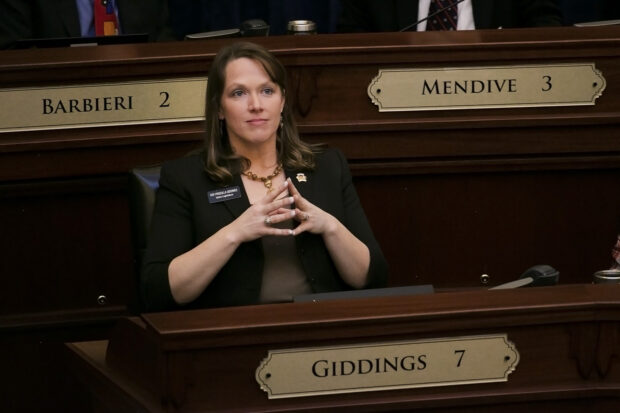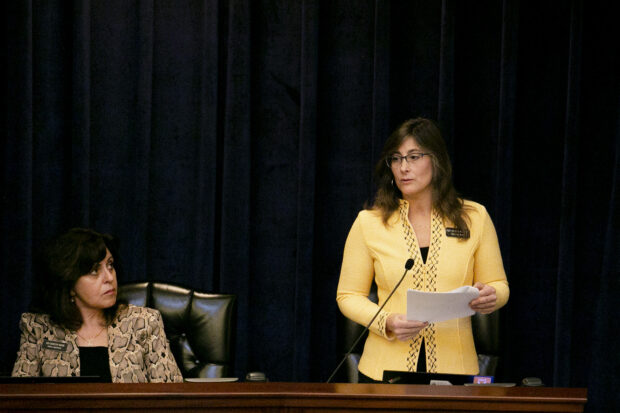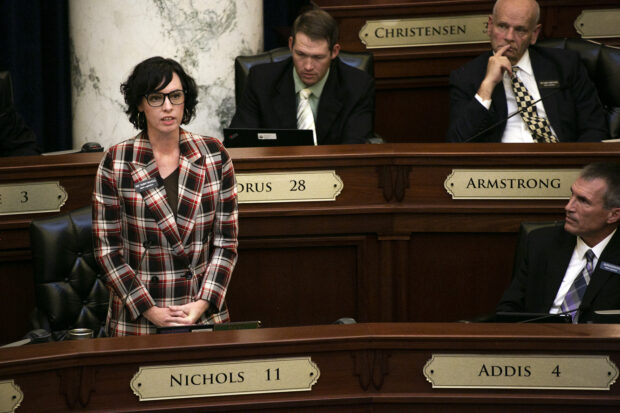
After nearly two hours of tense debate, the House voted overwhelmingly Monday morning to sanction Rep. Priscilla Giddings.
The bipartisan 49-19 vote closes a chapter that began in August, when a House ethics committee voted unanimously to sanction the White Bird Republican, who posted a news article that identified “Jane Doe,” the former House intern who has accused former Rep. Aaron von Ehlinger of rape.
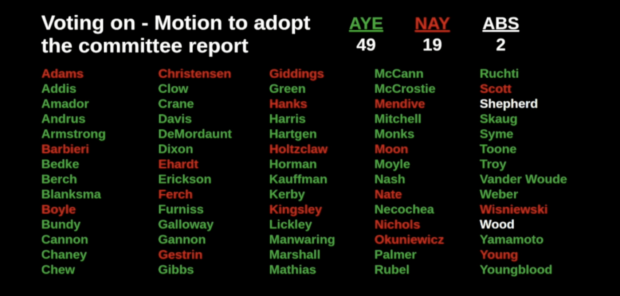 The debate — and the ultimate vote to adopt the committee report — ran sharply across ideological lines, with some hardline conservatives rising to Giddings’ defense. And the political subtext was inescapable, as both Giddings and House Speaker Scott Bedke are among three Republicans running for the open lieutenant governor’s seat.
The debate — and the ultimate vote to adopt the committee report — ran sharply across ideological lines, with some hardline conservatives rising to Giddings’ defense. And the political subtext was inescapable, as both Giddings and House Speaker Scott Bedke are among three Republicans running for the open lieutenant governor’s seat.
“I will continue the fight for freedom in a nation that is slowly losing it,” an unrepentant Giddings said at the close of her 20-minute debate. “I would not have done anything differently.”
After her debate, Giddings received a boisterous round of applause from supporters in the House gallery. Bedke, presiding over Monday’s debate, was quick to admonish the audience.
“If there’s another outburst like this, we will clear the gallery,” said Bedke, R-Oakley. “You are forewarned.”
With Monday’s vote, the House censured Giddings and removed her from the House Commerce and Human Resources Committee. Giddings retains her other committee assignments, including a seat on the powerful budget-writing Joint Finance-Appropriations Committee.
Giddings’ House defenders focused on several recurring themes. They said Giddings should not be punished for reposting an article that contained the name and photo of “Jane Doe,” saying she did so simply to keep her constituents informed. They questioned the $63,000 legal costs of the ethics investigation. And they criticized some language in the report, which accused Giddings of lying and treating the ethics committee with disrespect.
“It appears that this committee has been weaponized to go after political opponents,” said Rep. Ron Nate, R-Rexburg.
None of the five ethics committee members debated Monday morning. Nor did any member of House GOP leadership, who voted unanimously to sanction Giddings.
A handful of House members — including Reps. Caroline Nilsson Troy, R-Genesee, and Gary Marshall, R-Idaho Falls — defended the ethics committee’s work, under difficult circumstances. And Rep. Greg Chaney, R-Caldwell, castigated Giddings for refusing to speak to the committee, where her comments could have been subject to charges of perjury. Instead, he said, Giddings chose to speak on the House floor, where her comments are legally protected.
”The body can extrapolate from that what it wishes,” Chaney said.
Monday’s vote highlighted the Legislature’s return to the Statehouse, after a 187-day hiatus.
During this unprecedented and undefined session, legislators are expected to address one central topic: the Biden administration’s coronavirus vaccine mandates.
Legislative leaders hope to wrap up business by Wednesday — just 54 days before lawmakers return to the Statehouse for the 2022 session.
Since the House never actually adjourned in May, voting instead to go on an extended, unpaid recess, Monday marked Day 309 of the 2021 session.
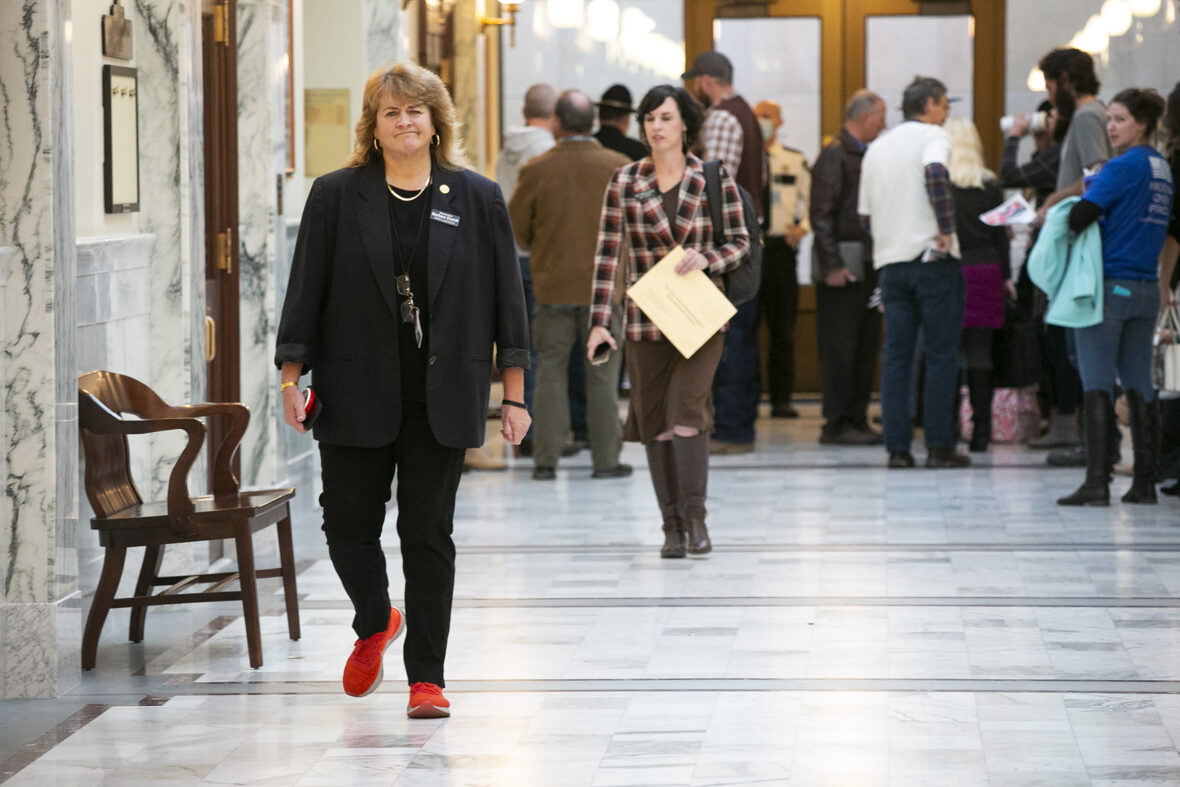
Here’s how the rest of the morning unfolded:
1:45 p.m.: JFAC kills legal fund to combat ‘federal overreach’
The Joint Finance-Appropriations Committee shot down a bid to create a $2 million “Federal Overreach Legal Defense Fund,” the only proposal it took up Monday.
House Bill 409 was one of multiple proposals made in committees Monday morning to create such a fund. It would have allowed the House speaker and Senate president pro tempore to cover Idaho’s legal bills out of the new pot of money. (There was debate among committee members whether both individuals would have to sign onto spending, based on the bill’s wording.)
Dissenting lawmakers on both sides of the aisle argued the state’s existing legal funds — including its constitutional defense fund — already exist to cover such court fees. Advocates like Rep. Sage Dixon, R-Ponderay, countered the fund would give the Legislature greater autonomy to take legal action when the governor chooses not to.
“I am quite anxious to ensure that Idaho has as much sovereignty as possible,” said Troy.
The 12-6 majority comprised an uncommon coalition, including the committee’s four Democrats as well as Giddings and Nate — JFAC’s most conservative members.
Dixon said the proposed fund wasn’t meant to cover existing legal fees but would bankroll future lawsuits against the federal government. But as the Legislature reconvenes to resist federal vaccine mandates, Statehouse Republicans’ heightened anxiety around federal overreach is notable.
By co-chair Rep. Rick Youngblood’s reading, the money could be used to “chip in” to aid the governor’s and attorney general’s fights against Biden vaccine mandates in court. But critics remained wary.
“We will be back in session in six weeks. I don’t anticipate us spending $2 million in the next six weeks,” said Nate. “We have nearly $5 million in legal funds already appropriated and sitting there.”
Voting in favor were Reps. Rick Youngblood, R-Nampa; Matthew Bundy, R-Mountain Home; and Troy; and Sens. Steve Bair, R-Blackfoot; C. Scott Grow, R-Eagle; Kevin Cook, R-Idaho Falls.
Voting against the fund were Reps. Wendy Horman, R-Idaho Falls; Paul Amador, R-Coeur d’Alene; Scott Syme, R-Caldwell; Brooke Green, D-Boise; Colin Nash, D-Boise; Nate and Giddings; and Sens. Carl Crabtree, R-Grangeville; Jim Woodward, R-Sagle; Dave Lent, R-Idaho Falls; Janie Ward-Engelking, D-Boise; and Mark Nye, D-Pocatello.
7:35 a.m.: A kickoff in the House
Amador, the chairman of the House Ways and Means Committee, kicked off Monday’s return of the session with an understatement. “We have quite the agenda.”
The leadership-packed committee then moved quickly, voting unanimously to introduce all 29 draft bills on its packed agenda.
A couple of the bills addressed the $2 million “Federal Overreach Legal Defense Fund” ultimately voted down by JFAC. One would create a blanket religious exemption for all medical procedures. Others ban employers from requiring vaccinations, or codify Gov. Brad Little’s April executive order banning state agencies from establishing “vaccine passports.”
Two draft bills don’t mention the vaccine issue at all — but instead focus on school academic standards. One, sponsored by House Education Committee Chairman Lance Clow, R-Twin Falls, would nullify English language arts, math and science standards entirely, clearing the way to adopt new, replacement guidelines coming from state standards review committees. The second bill, co-sponsored by Clow and Senate Education Committee Chair Steven Thayn, R-Emmett, would direct the State Board of Education to adopt the new standards.
Neither measure will get a hearing, Clow said Monday afternoon.
Other bills address various aspects of pandemic protocols.
- One bill, from Rep. Karey Hanks, R-St. Anthony, would ban all mask mandates — a ban that would extend to school districts and colleges and universities. The House passed a similar bill from Hanks in the spring, but the Senate did not take it up.
- A bill from Nate would allow parents and children to opt out of any protocols, including masks and plexiglass barriers.
- Barbara Ehardt, R-Idaho Falls, proposes to require parental consent for all treatment of “infectious, contagious or communicable disease.”
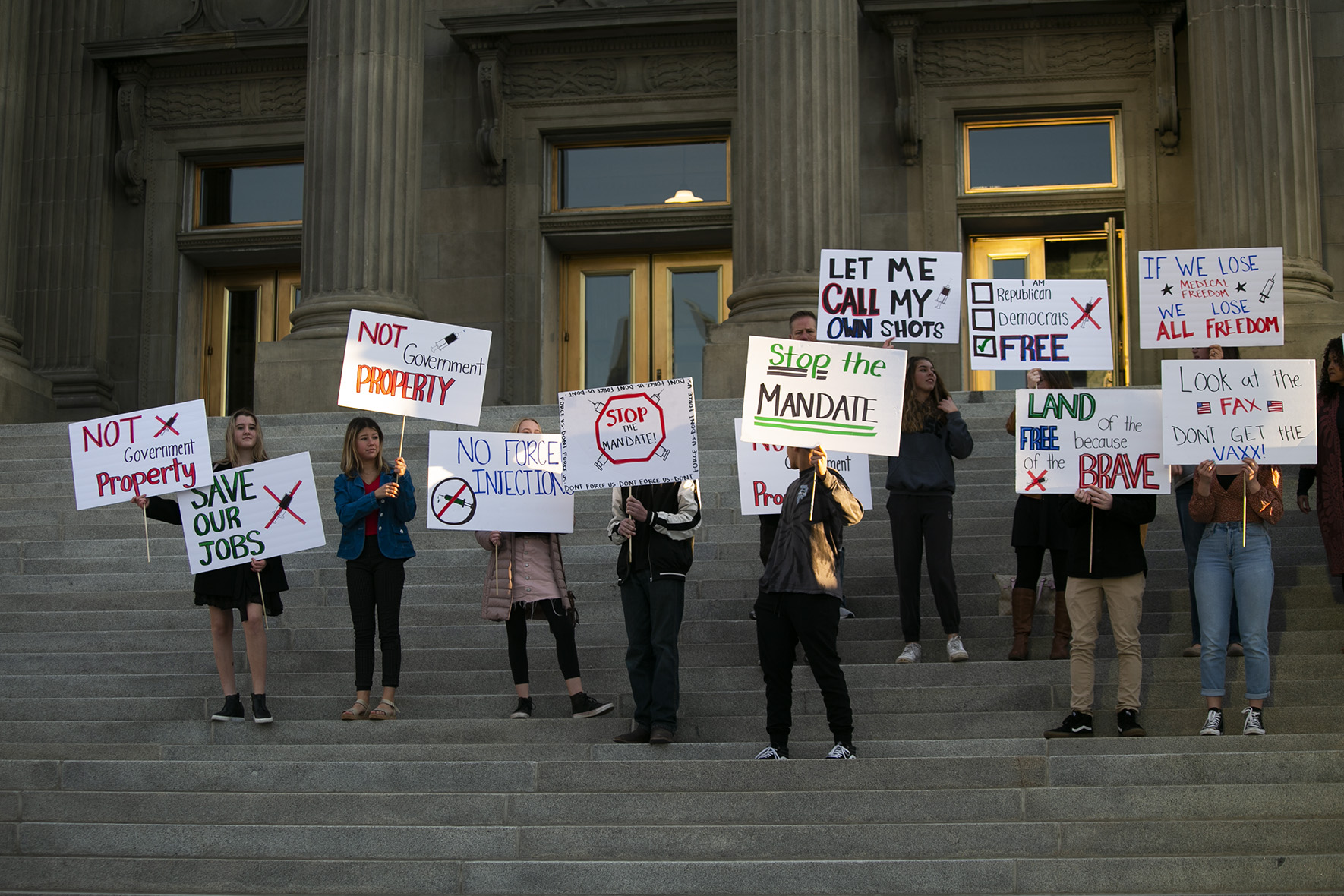
8:53 a.m.: A delayed start in the Senate
The Senate State Affairs Committee quickly churned through a seven-proposal agenda within five minutes Monday morning, formally introducing pandemic-related draft proposals unanimously without debate.
All but one proposal were geared at resisting vaccine mandates, which Idaho has already joined two lawsuits to fight. A resolution from Senate Pro Tempore Chuck Winder and Bair worked to establish the “federal overreach” legal defense fund. Other Republicans’ proposals aimed to effectively ban or limit employer vaccine mandates through various legal channels; one seeks to add an exemption for employers’ vaccine requirements, allowing a “natural immunity exemption” for employees who can produce a positive coronavirus test or antibody test showing heightened immunity.
The lone proposal from a Democrat — Assistant Minority Leader Grant Burgoyne of Boise — pushes for coronavirus-related funding, including:
- Reimbursing employers if their employees take off time from work to receive a coronavirus vaccine, or need time to recover form adverse effects from the vaccine.
- Rapid coronavirus testing for Idahoans, including school staff and students, and funding for mobile vaccination clinics.
- A “sick leave bank” for public employees, including school personnel. Senate Democrats placed this item on their legislative wish list Friday, as EdNews reported.
The bill didn’t lay out how much money could go to any of those causes.
The committee missed its 8 a.m. scheduled start by nearly an hour, as Senate Republicans held a closed-door caucus Monday morning.
Later Monday morning, as the House debated Giddings’ censure, the Senate met quickly, but took little action.
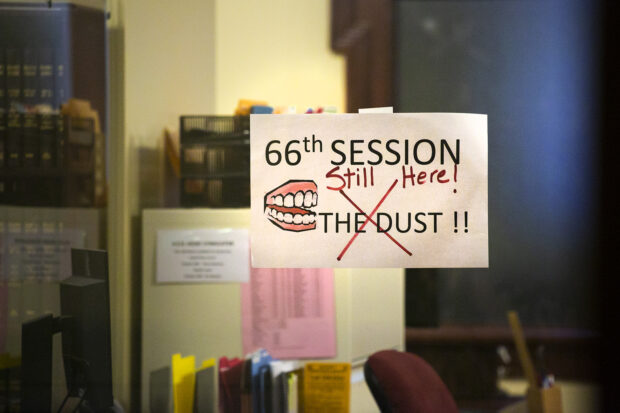
Before taking some procedural moves, Sen. Majority Leader Kelly Anthon, R-Burley, called for the Senate to work “as efficiently as possible” to “ensure that (reconvening) is not a waste of taxpayer dollars.”
Burgoyne made an unsuccessful attempt at adjourning the chamber for the year, as the Senate did in May. He urged senators not to take up any new business unless a court voids the sine die declaration the chamber made in May. His motion failed 27-6, pulling Democratic support.

